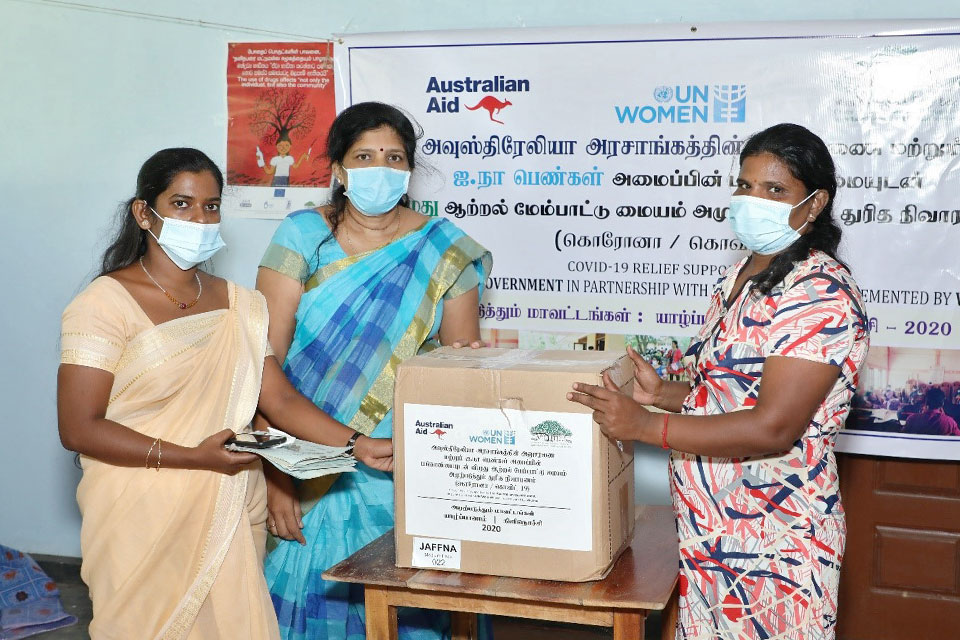Supporting female heads of households to overcome COVID-19’s economic toll in Sri Lanka
Date:

“During the COVID-19 lockdown, we struggled to find money for food. We managed to take loans from our neighbours,” says Tharshani Kumar*. “[When schools re-opened], I had to send my son to school without breakfast every morning. I was afraid that he would not be able to continue his education.”
Kumar was 30 years old and a mother of three young children when her husband died. She became her family’s sole breadwinner, while also caring for her children.
Now, at 45, she lives in Jaffna (in Sri Lanka’s Northern Province) with a disability that makes it difficult for her to work. Her income from poultry farming dropped significantly once the COVID-19 lockdowns started in 2020. Her eldest daughter – whom they had relied on for household expenses – also had to stay at home, which meant she was left without a daily income to support her family.
Women heads of households are bearing the brunt of the COVID-19 crisis
Kumar’s story is by no means unusual in Sri Lanka, where over a quarter of households are headed by women. As many as 1.7 million women in the country are also engaged in informal employment and are not entitled to social protection and employment benefits.
Across Jaffna, another mother, Vanitha Selvam* (37), cares for her family of six. Her family lives in a makeshift hut and does not get much support from her husband who is an alcohol addict.
Selvam was pregnant during the lockdown. Her family lived mainly on bread and were only able to have two small meals a day. “I was not getting enough nourishment for my baby,” she says. “We also had to repay the loans for my children’s care and education.”
The struggle of mothers like Kumar and Selvam echoes across Sri Lanka.
In Kilinochchi District, 42-year-old Kayathri Chinnaiya* lives with her two daughters who are still in school. Her husband abandoned her; she doesn’t receive any support from him. As a daily wage worker, her income has been hard hit by the pandemic and she is barely able to take care of her family.
During the lockdown, she earns a meagre income by grinding flour and roasting spices. She says that most of this income was spent on food and she found it difficult to support her children’s education.
Response and recovery: supporting female heads of households
“The socio-economic impact of COVID-19 has been severe for women in Sri Lanka and other countries in Asia and the Pacific, many of whom were highly vulnerable even before the pandemic – given that a large number of women have insecure and often low paid informal jobs,” says Ramaaya Salgado from UN Women in Sri Lanka.
“When women lack access to adequate social protection, they are likely to be burdened with unpaid care and domestic work, and as a result, tend to lose their livelihoods faster.”
In the wake of COVID-19, women and girls must be placed at the centre of response and recovery efforts.
“Applying a gender lens in designing social assistance programmes and investing in women’s economic empowerment is an opportunity for Sri Lanka to build back better from the crisis,” says Salgado.
In an effort to support mothers like Kumar, Selvam and Chinnaiya, UN Women in Sri Lanka – with support from the Government of Australia – provided emergency relief packages to female-headed households in Jaffna and Kilinochchi districts alongside Viluthu, a local NGO. Over 1,300 women heads of households economically impacted by the pandemic were supported through the initiative.
With the relief packs, Kumar and Selvam were relieved to see their children enjoy a proper meal.
Hopeful for the future, Chinnaiya says: “Having received dry rations and hygiene items necessary for the household for the month, I am hopeful that I can save enough money for my children’s education. I have two beautiful girls and I live only for them.”
*Names have been changed to maintain confidentiality